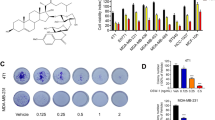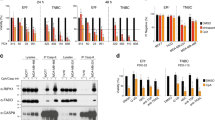Abstract
The present study investigates the underlying mechanisms of treatment with osthole (OST) combined with lobaplatin in human triple-negative MDA-MB-231 breast cancer cells. Human triple-negative MDA-MB-231 breast cancer cells were treated with different concentrations of OST (0.1, 1, 5, 10, 20, 50, and 100 μM) alone or in combination with 10 μM lobaplatin for 48 h. Cell viability was determined and compared between the treatment groups with the Cell Counting Kit-8 assay. Transcriptome sequencing (Project Number: M-GSGC0250521) was employed to elucidate the gene expression profile of the control group and the OST treatment group, and differentially expressed genes (DEGs) were identified based on the following criteria: log2FC > 0, P < 0.05. KEGG enrichment analysis was employed to determine the biological functions of these DEGs and the related signaling pathways. Finally, flow cytometry and western blotting were used to assess differences in the apoptosis rate and protein expression in MDA-MB-231 cells subjected to different treatments. The findings showed that OST inhibited the growth of MDA-MB-231 cells in a concentration-dependent manner and cell proliferation was significantly inhibited (as indicated by a decrease of 40%) at the OST concentration of 50 μM (P < 0.05). Transcriptome sequencing identified 4712 DEGs, including 2169 upregulated DEGs and 2543 downregulated DEGs. Enrichment analysis indicated that the DEGs played a role in apoptosis, p53 signaling, DNA replication, and cell cycle. In vitro experiments showed that OST and lobaplatin could significantly induce apoptosis in the MDA-MB-231 cells (P < 0.05), as indicated by elevation in the translation level of p53/Bax/caspase-3 p17 and downregulation of the Bcl-2 protein. Finally, combined treatment with OST and lobaplatin had an enhanced anti-tumor effect (P < 0.05) on proliferation and apoptosis, as well as more obvious effects on the related proteins (p53, Bax, Bcl-2, and caspase-3 p17). Thus, OST enhanced the apoptosis-mediated growth inhibitory effect of lobaplatin on breast cancer cells and has potential for the treatment of breast cancer in the future.






Similar content being viewed by others
References
Sung H, et al. Global cancer statistics 2020: GLOBOCAN estimates of incidence and mortality worldwide for 36 cancers in 185 countries. CA Cancer J Clin. 2021;71:209–49. https://doi.org/10.3322/caac.21660.
Tian W, et al. Lobaplatin inhibits breast cancer progression, cell proliferation while it induces cell apoptosis by downregulating MTDH expression. Drug Des Devel Ther. 2018;12:3563–71. https://doi.org/10.2147/DDDT.S163157.
Sumorek-Wiadro J, et al. Antiglioma potential of coumarins combined with sorafenib. Molecules. 2020. https://doi.org/10.3390/molecules25215192.
Ashrafizadeh M, et al. Anti-tumor effects of osthole on different malignant tissues: A review of molecular mechanisms. Anticancer Agents Med Chem. 2020;20:918–31. https://doi.org/10.2174/1871520620666200228110704.
Shokoohinia Y, et al. Potential anticancer properties of osthol: A comprehensive mechanistic review. Nutrients. 2018. https://doi.org/10.3390/nu10010036.
Jarzab A, Grabarska A, Skalicka-Wozniak K, Stepulak A. Pharmacological features of osthole. Postepy Hig Med Dosw (Online). 2017;71:411–21. https://doi.org/10.5604/01.3001.0010.3824.
Huang SM, Tsai CF, Chen DR, Wang MY, Yeh WL. p53 is a key regulator for osthole-triggered cancer pathogenesis. Biomed Res Int. 2014;2014: 175247. https://doi.org/10.1155/2014/175247.
Ye J, Sun D, Yu Y, Yu J. Osthole resensitizes CD133(+) hepatocellular carcinoma cells to cisplatin treatment via PTEN/AKT pathway. Aging (Albany NY). 2020;12:14406–17. https://doi.org/10.18632/aging.103484.
Chen TJ, et al. NBM-T-BMX-OS01, an osthole derivative, sensitizes human lung cancer A549 cells to cisplatin through AMPK-dependent inhibition of ERK and Akt pathway. Cell Physiol Biochem. 2015;36:893–906. https://doi.org/10.1159/000430264.
Zhu X, et al. Osthole induces apoptosis and suppresses proliferation via the PI3K/Akt pathway in intrahepatic cholangiocarcinoma. Int J Mol Med. 2017;40:1143–51. https://doi.org/10.3892/ijmm.2017.3113.
Liu PY, et al. Osthole induces human nasopharyngeal cancer cells apoptosis through Fas-Fas ligand and mitochondrial pathway. Environ Toxicol. 2018;33:446–53. https://doi.org/10.1002/tox.22530.
Wang Z, et al. Lobaplatin induces apoptosis and arrests cell cycle progression in human cholangiocarcinoma cell line RBE. Biomed Pharmacother. 2012;66:161–6. https://doi.org/10.1016/j.biopha.2011.09.008.
Lieke T, et al. Impact of Salinomycin on human cholangiocarcinoma: induction of apoptosis and impairment of tumor cell proliferation in vitro. BMC Cancer. 2012;12:466. https://doi.org/10.1186/1471-2407-12-466.
Xie CY, Xu YP, Jin W, Lou LG. Antitumor activity of lobaplatin alone or in combination with antitubulin agents in non-small-cell lung cancer. Anticancer Drugs. 2012;23:698–705. https://doi.org/10.1097/CAD.0b013e328352cc10.
Li X, Ran L, Fang W, Wang D. Lobaplatin arrests cell cycle progression, induces apoptosis and alters the proteome in human cervical cancer cell Line CaSki. Biomed Pharmacother. 2014;68:291–7. https://doi.org/10.1016/j.biopha.2013.10.004.
Wu X, et al. A randomized and open-label phase II trial reports the efficacy of neoadjuvant lobaplatin in breast cancer. Nat Commun. 2018;9:832. https://doi.org/10.1038/s41467-018-03210-2.
Wang Z, et al. Lobaplatin-based regimens outperform cisplatin for metastatic breast cancer after anthracyclines and taxanes treatment. Saudi J Biol Sci. 2018;25:909–16. https://doi.org/10.1016/j.sjbs.2018.01.011.
Dai X, et al. Osthole inhibits triple negative breast cancer cells by suppressing STAT3. J Exp Clin Cancer Res. 2018. https://doi.org/10.1186/s13046-018-0992-z.
Xu X, Liu X, Zhang Y. Osthole inhibits gastric cancer cell proliferation through regulation of PI3K/AKT. PLoS One. 2018. https://doi.org/10.1371/journal.pone.0193449.
Jiang G, et al. Anti-tumor effects of osthole on ovarian cancer cells in vitro. J Ethnopharmacol. 2016. https://doi.org/10.1016/j.jep.2016.08.045.
Liu PY, et al. Osthole induces human nasopharyngeal cancer cells apoptosis through Fas-Fas ligand and mitochondrial pathway. Environ Toxicol. 2018. https://doi.org/10.1002/tox.22530.
Che Y, et al. Osthole enhances antitumor activity and irradiation sensitivity of cervical cancer cells by suppressing ATM/NF-κB signaling. Oncol Rep. 2018. https://doi.org/10.3892/or.2018.6514.
Wang L, et al. Osthole inhibits proliferation of human breast cancer cells by inducing cell cycle arrest and apoptosis. J Biomed Res. 2015. https://doi.org/10.7555/JBR.27.20120115.
Liu F, Di Wang X. miR-150-5p represses TP53 tumor suppressor gene to promote proliferation of colon adenocarcinoma. Sci Rep. 2019;9:6740. https://doi.org/10.1038/s41598-019-43231-5.
Tian W, et al. Lobaplatin inhibits breast cancer progression, cell proliferation while it induces cell apoptosis by downregulating MTDH expression. Drug Des Devel Ther. 2018;12:3563–71.
Wróblewska-Łuczka P, Grabarska A, Florek-Łuszczki M, Plewa Z, Łuszczki JJ. Synergy, additivity, and antagonism between cisplatin and selected coumarins in human melanoma cells. Int J Mol Sci. 2021. https://doi.org/10.3390/ijms22020537.
Zhou Y, et al. Discovery of a potential MCR-1 inhibitor that reverses polymyxin activity against clinical mcr-1-positive Enterobacteriaceae. J Infect. 2019;78:364–72. https://doi.org/10.1016/j.jinf.2019.03.004.
Acknowledgements
All the authors are very grateful to Prof. Xiaowei Qi for providing assistance in reviewing the manuscript.
Funding
This study was supported by the Program for Xinglin Scholars Scientific Research Promotion Plan of Chengdu University of Traditional Chinese Medicine (Grant Number: YYZX20180036) and Project of Young and Middle-aged Innovative Talents of 2017 Jiangbei District.
Author information
Authors and Affiliations
Contributions
NL performed the experiment and wrote the paper. NL, HT, MH, and NS contributed to the bioinformatics analysis and figure preparation. HT modified the structure and language of the manuscript. SMW contributed to the conception and design of the study and the revision of the manuscript. All authors have read and approved the final manuscript.
Corresponding author
Ethics declarations
Conflict of interest
The authors report no conflict of interest.
Additional information
Publisher's Note
Springer Nature remains neutral with regard to jurisdictional claims in published maps and institutional affiliations.
Rights and permissions
About this article
Cite this article
Liu, N., Tian, H., Zhang, G. et al. Effect of combined treatment with lobaplatin and osthole on inducing apoptosis and inhibiting proliferation in human breast cancer MDA-MB-231 cells. Med Oncol 39, 16 (2022). https://doi.org/10.1007/s12032-021-01609-4
Received:
Accepted:
Published:
DOI: https://doi.org/10.1007/s12032-021-01609-4




